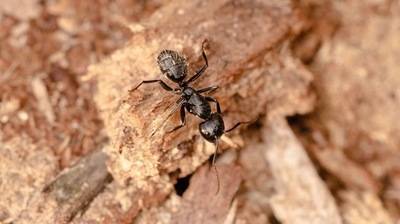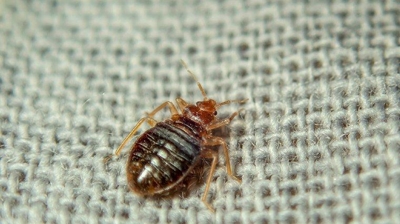
Stinging Insects
What are stinging insects?
Stinging insects are insects that use a venom-filled stinger to defend themselves. Stinging insects are often described either as beneficial or unwanted, depending on where they build their nests. When nesting outside and away from people, stinging insects are beneficial, and are responsible for pollinating plants and crops. Predatory species control populations of nuisance insects. When stinging insects build their nests near homes, they become unwanted pests because the likelihood of a sting occurring greatly increases.
Carpenter bees
Carpenter bees are large in size, black and yellow in color, and are often mistaken for bumble bees. Carpenter bees have smooth, shiny, black abdomens, unlike bumble bees, whose abdomens are yellow and hairy.
Ground bees
Ground bees are more often identified by where they nest, not by how they look. As their name describes, ground bees live in the ground. These bees are typically solitary, creating individual nests. They build their nests in the dirt, abandoned animal nests, or in ground-level objects like rotting logs or tree stumps.
Hornets
The only true hornet found in the United States is the European hornet. European hornets are long and full-bodied. They are brown with yellow stripes on their abdomen. Their face is pale in color. Unlike most species of stinging insects, European hornets can be active at night.
Wasps
Wasps' appearance is species-dependent, but in general, most have two pairs of wings and a cinched waist. Wasps are usually void of body hair. Common examples of wasps include paper wasps and yellow jackets. Despite their name, bald-faced hornets are also a type of wasp.
Yellow jackets
Yellow jackets are a predatory species of stinging insect that feed on a variety of other insects. Yellow jackets have segmented, hairless bodies, and distinct thin waists. When at rest, their wings fold laterally against their bodies. The yellow jacket’s face and head is a blend of black and yellow. Their bodies have a well-defined black and yellow striped pattern on them.
Are stinging insects dangerous?
Stinging insects have the potential to be dangerous. While not all species of stinging insects are aggressive, they all have the ability to deliver painful, venom-filled stings. Their venom is powerful enough to trigger serious allergic reactions and anaphylaxis in some people, which requires immediate medical attention.
Why do I have a stinging insect problem?
Stinging insects are nesting and feeding on your property because it is offering them what they need to thrive. Stinging insects, depending on their exact species feed on a variety of items, including insects, proteins, nectar, sweets, and honeydew. Compost piles, garbage cans, gardens, flowering vegetation, untreated wooden structures (carpenter bees), clogged gutters, outdoor eating areas, bird baths, and ponds all attract stinging insects. Stinging insects can become a problem on almost any property. Contact a professional to remove a nest that has been placed in a dangerous location on your your northern New Jersey property.

What Makes Us Different
At Heritage Pest Control, we will always put you first. That's why so many people in Pompton Plains trust us time and again.
-
Service with
Integrity -
Over 3 Decades
of Experience -
Innovative Methods
& Techniques -
Fully Trained &
Equipped Team
Where will I find stinging insects?
Stinging insects are most active during the end of summer and early fall, when their colonies are at their peak numbers and they are out foraging for food to feed their colony. Stinging insects build their nests in a variety of locations, as long it provides them with protection and shelter. Trees, rock crevices, utility poles, the ground, shrubs, and bushes are common stinging insect nesting spots. They may also build their nest underneath porches, decks, and roof eaves.
How do I get rid of stinging insects?
The best way to solve the stinging insect problem on your northern New Jersey property is to partner with a local pest control company. When you partner with us at Heritage Pest Control, our reliable and friendly professionals will be at your residential or commercial property within 24 hours to assess the infestation and recommend treatment. We are proud to provide all of our customers with reliable, affordable, and environmentally friendly pest solutions. To learn more about our stinging insect control services, reach out to us!

Hear From Our Happy Customers
At Heritage Pest Control, your satisfaction is our priority! See for yourself what our customers have to say about working with us.
-
"Thank you, Heritage!"Rick and heritage pest control were amazing!!!- Mary K.
-
"Perfect customer service."Such a professional, helpful and totally committed company. It was nothing but a total pleasure to work with ALL the staff who so promptly took care of our uninvited guests in the attic.- Vini M.
-
"I have been using them for years."They go above and beyond. They call you a day before your scheduled appt as a reminder. They show up when they are supposed to.- Lisa T.
-
"A New Loyal Customer"Very professional, easy to communicate and showed up on time. So far no bugs/spiders. Highly recommend- Alex C.
-
"Professional & Pleasant"
Very good experience. They were professional and very pleasant to work with. Highly recommend
- Engin B. -
"No One Better!"The job was performed (an all day affair)neatly and professionally. I have recommended them to friends already.- Marybeth C.
-
"10 out of 10"This business is very reliable and dependable, they really care about pleasing and working with their customers!- Schmidt C.
-
"Polite, Professional, & Knowledgeable"Heritage responded to an urgent call for a hornet nest in my attic last year and I decided to keep an annual contract with them, which includes insects (all bugs) and mice. After I saw mice recently they came and provided that service too.- Paul R.
Heritage Pest Control's Blog
Want all the latest news or updates? Browse through our blog to read our most recent posts and featured articles.

